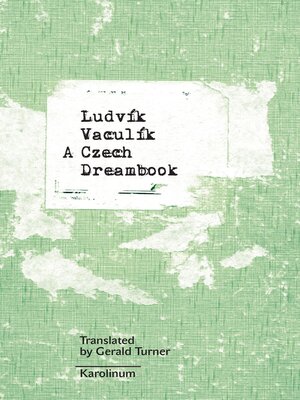
Sign up to save your library
With an OverDrive account, you can save your favorite libraries for at-a-glance information about availability. Find out more about OverDrive accounts.
Find this title in Libby, the library reading app by OverDrive.



Search for a digital library with this title
Title found at these libraries:
| Library Name | Distance |
|---|---|
| Loading... |
It's 1979 in Communist Czechoslovakia, ten years into the crushing period known as normalization, and Ludvík Vaculík has writer's block. It has been nearly a decade since he wrote his powerful novel, The Guinea Pigs, and it was in 1968 that he wrote his anti-regime manifesto, Two Thousand Words, which the Soviet Union used as a pretext for invading Czechoslovakia. On the advice of his friend, the poet and surrealist painter Jiří Kolář, Vaculík begins to keep a diary, "a book about things, people, and events." This marks the beginning of A Czech Dreambook.
Fifty-four weeks later, what Vaculík turns out to have written is a unique mixture of diary, dream journal, and outright fiction—an inverted roman à clef in which the author, his family, his mistresses, and the real leaders of the Czech underground play major roles. Undisputedly the most debated novel among the Prague dissident community of the 1980s, it is a work that Vaculík himself described as an amalgam of "hard-boiled documentary" and "magic fiction," while Václav Havel called it "a truly profound and perceptive account. . . . A great novel about modern life and the crisis of contemporary humanity."
A Czech Dreambook has been hailed as the most important work of Czech literature in the past forty years. And yet it has never before been available in English. Flawlessly translated by Gerald Turner, Vaculík's masterpiece is a brilliant exercise in style, dry humor, and irony—an important portrait of the lives and longings of the dissidents and post-Communist elites.
Fifty-four weeks later, what Vaculík turns out to have written is a unique mixture of diary, dream journal, and outright fiction—an inverted roman à clef in which the author, his family, his mistresses, and the real leaders of the Czech underground play major roles. Undisputedly the most debated novel among the Prague dissident community of the 1980s, it is a work that Vaculík himself described as an amalgam of "hard-boiled documentary" and "magic fiction," while Václav Havel called it "a truly profound and perceptive account. . . . A great novel about modern life and the crisis of contemporary humanity."
A Czech Dreambook has been hailed as the most important work of Czech literature in the past forty years. And yet it has never before been available in English. Flawlessly translated by Gerald Turner, Vaculík's masterpiece is a brilliant exercise in style, dry humor, and irony—an important portrait of the lives and longings of the dissidents and post-Communist elites.







